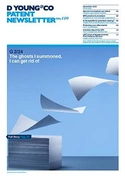Lessons from Carrier v Bitzer: parallel proceedings at the EPO and UPC
Since the Unified Patent Court (UPC) opened its doors a little over a year ago, the European patent system has been adjusting to the presence of a new pillar alongside the European Patent Office (EPO).
Each has its own non-overlapping area of competence: the UPC plays no part in the granting of European patents, and the EPO plays no part in their enforcement.
In these matters the co-existence of the EPO and UPC is relatively uncomplicated. However, both bodies are competent to make binding decisions on the validity of European patents, to the extent such patents have not been opted out of the UPC’s jurisdiction. This overlapping competency of the UPC and EPO in assessing validity is a subject of significant interest for users of the European patent system, given the potential for the same European patent to be simultaneously the subject of UPC proceedings and EPO opposition or limitation proceedings, a situation known as parallel proceedings.
A goal of the enhanced European patent system is to seek greater harmonisation, and certain statutory provisions appear to directly support this aim. For the UPC’s part, Article 33(10) of the UPC Agreement, and Rule 295(a) of the UPC Rules of Procedure, make specific provision for UPC proceedings to be stayed when a decision in parallel EPO opposition or limitation proceedings can be expected rapidly. While acknowledging that it may be useful to wait for the EPO to issue a decision, allowing this to be followed or at least taken into account at the UPC, these statutory provisions also expressly balance this potential benefit against the UPC’s goal of reaching timely decisions.
The question has been how the UPC might assess this balance in practice, and the weight it might place on deference to the EPO in assessment of validity in parallel proceedings. In its recent decision in Carrier Corporation v BITZER Electronics A/S the UPC Court of Appeal has now provided some answers.
The appealed decision relates to a request for a stay of proceedings under Rule 295(a) of the UPC Rules of Procedure, relating to a revocation action brought against Carrier, by Bitzer, in respect of claim 1 of Carrier’s European patent EP3414708B1. The revocation action was filed at the Paris Central Division on 29 June 2023, one day after Bitzer had filed an opposition against the patent as a whole at the EPO, citing all available grounds under Article 100 of the European Patent Convention (EPC). On 01 November 2023 Carrier requested acceleration of the opposition proceedings, and on 01 December 2023 requested a stay of proceedings in the UPC revocation action, citing amongst other factors the cost burden and procedural inefficiency of litigating the same patent before the EPO and UPC in parallel. The requested acceleration of the EPO opposition was also cited in support of Carrier’s request. The near-simultaneous initiation of the UPC and EPO proceedings provides a useful test case for how the UPC intends to account for parallel proceedings at the EPO.
Balancing of stay factors at the UPC
The UPC Court of Appeal has now maintained the first-instance decision to reject Carrier’s request for a stay of the UPC proceedings. The court’s decision appears to emphasise the intention of the UPC to exercise its independence from the EPO in determinations on validity. In particular, the court expressly rejected the idea that a decision of either the UPC or the EPO should take precedence in parallel proceedings, pointing out “…that the body that decides last can take the decision of the body that decides first into account in its decision” (ORD_25123/2024).
As far as the court is concerned, the goal of harmonisation does not require either of the UPC or EPO to consistently defer to the other body’s decisions on validity. Each body can act independently, and the degree of harmonisation in parallel proceedings will depend on the willingness of the body deciding the case second to follow the decision of the body deciding first. The UPC might have decided to show more deference to validity assessments of the EPO, preferring to stay proceedings as a matter of course in parallel proceedings, noting that Article 24(1) of the UPC Agreement might be read as supporting this approach. However, the decision highlights both the UPC’s independence, and the emphasis it places on seeking to provide comparatively rapid decisions, making explicit reference to the goal of rendering first-instance decisions within one year. It seems clear from the court’s reasoning that this goal takes precedence over deference to validity determinations at the EPO in cases where parallel proceedings bring the two into tension. For the UPC to have legal certainty of the EPO’s decision in parallel proceedings, the court noted it would often need to stay its own proceedings until the end of the EPO appeal procedure: a delay of potentially many years.
The decision makes specific reference to the Bitzer’s “interest in a decision on its freedom to operate as quick and as far as possible” (ORD_25123/2024) as part of its analysis of the balance of interest of the parties. In the case at issue this interest outweighed Carrier’s interests in reducing the alleged burden of litigating both proceedings simultaneously. On the latter point, the court referred to the comparatively late stage of the UPC revocation proceedings, with a substantial proportion of costs already expended. But the court also considered the costs of the revocation action might yet prove advantageous to Bitzer. While revocation by the EPO in the opposition proceedings would obviate the UPC proceedings, the EPO might equally decide to uphold the patent or maintain it in amended form, in which case a decision to revoke by the UPC would be decisive (at least in the UPC member states).
Acceleration of EPO opposition proceedings
A further significant aspect of the decision relates to the acceleration of parallel EPO opposition proceedings. The EPO had, on request of the proprietor, accelerated opposition proceedings by a communication issued 02 February 2024. However, due to issues finding an earlier date which suited all parties, the acceleration did not bring the EPO’s oral proceedings earlier than either the scheduled UPC hearing, or within the one year period from initiation of the main action, by which the UPC expressly aims to be able to render a first-instance decision. Accordingly, the court rejected the notion that a request for acceleration of EPO opposition proceedings (whether granted or not) should lead to a stay per se, absent any practical influence on the EPO’s expected decision date. As the decision sets out: “…acceleration as such is… not sufficient for establishing the expectation of a rapid decision within the meaning of Rule 295(a) RoP” (emphasis added).
However, the court did acknowledge that an acceleration of EPO proceedings could be a more decisive factor in a determination under Rule 295(a) of the UPC Rules of Procedure if it practically changes when the EPO might issue its decision. It appears that acceleration of proceedings at the EPO is only likely to lead to a stay in parallel UPC proceedings if it enables the EPO’s decision to be issued prior to that of the UPC. In practice this would seem to require the EPO’s decision to issue early enough that the relevant UPC panel can fully account for it in the reasoning for its own decision.
Remaining questions
Finally, the assertion of independence by the UPC in the Carrier v Bitzer decision focuses some as yet unresolved questions for harmonisation of the European patent system. In parallel proceedings, where a first one of the EPO and UPC maintains a patent, the second entity will have to determine whether to follow this decision. At present, it appears entirely possible for both bodies to maintain the same European patent in differing forms (that is, with differing claim scope).
The question of downstream consequences, and those for enforcement in particular, appears to require clarification. At least some light seems soon to be shed on this question by the wider dispute between Bitzer and Carrier. The UPC Central Division has recently issued its decision in the main revocation action, in which it maintains the patent based on AR2. However, in the parallel EPO opposition proceedings, the same request (numbered as AR1) has been preliminarily assessed as lacking novelty.
With oral proceedings in the opposition proceedings imminent (scheduled for 24 October 2024), it will be interesting to see whether or not the Opposition Division modifies this preliminary and non-binding opinion to align with the UPC’s decision. If it does not, and it maintains the patent with different scope as opposed to revoking it entirely, it seems further development of case law will be required to clarify how the apparent tension should be resolved.
Case details at a glance
Jurisdiction: UPC Court of Appeal Luxembourg (LU)
Case: APL_3507/2024
Order/decision reference: ORD_25123/2024
Parties: Carrier Corporation v BITZER Electronics A/S
Date: 28 May 2024
Useful links
- Article 33(10), Chapter VI, Part 1, Agreement on a Unified Patent Court, 19 February 2013: dycip.com/UPC-agreement-article33
- Rule 295(a), UPC Rules of Procedure, 01 September 2022 (PDF): dycip.com/upc-rulesofprocedure
- Decision of the Court of First Instance of the UPC, Central Division (Paris seat), Carrier Corporation v BITZER Electronics A/S, UPC_CFI_263/2023, 29 July 2024 (PDF): dycip.com/upc-carrier-bitzer-jul24


